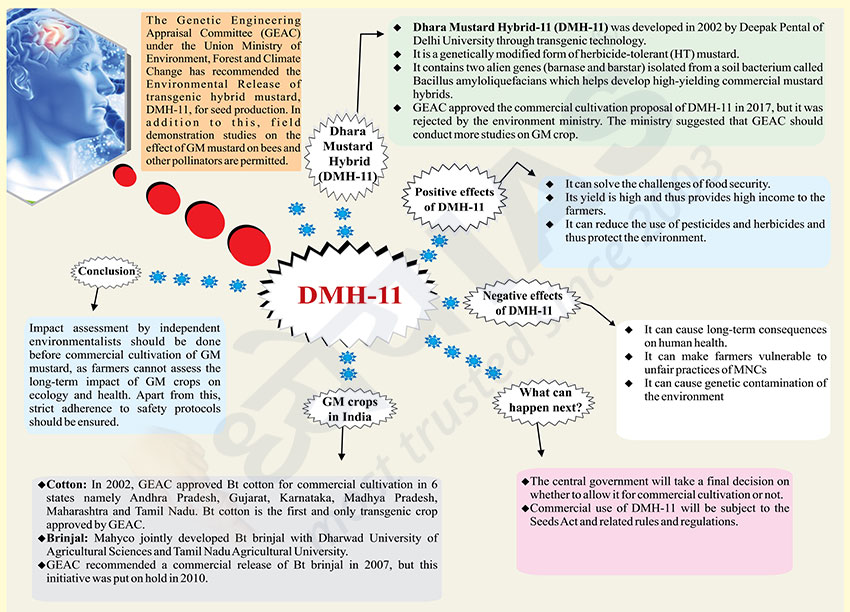Brain-booster /
14 Nov 2022
Brain Booster for UPSC & State PCS Examination (Topic: DMH-11)

The Genetic Engineering Appraisal Committee (GEAC)
under the Union Ministry of Environment, Forest and Climate Change
has recommended the Environmental Release of transgenic hybrid
mustard, DMH-11, for seed production. In addition to this, field
demonstration studies on the effect of GM mustard on bees and other
pollinators are permitted.
Dhara Mustard Hybrid (DMH-11)
-
Dhara Mustard Hybrid-11 (DMH-11) was developed in
2002 by Deepak Pental of Delhi University through transgenic technology.
-
It is a genetically modified form of herbicide-tolerant
(HT) mustard.
-
It contains two alien genes (barnase and barstar)
isolated from a soil bacterium called Bacillus amyloliquefacians which helps
develop high-yielding commercial mustard hybrids.
-
GEAC approved the commercial cultivation proposal of
DMH-11 in 2017, but it was rejected by the environment ministry. The
ministry suggested that GEAC should conduct more studies on GM crop.
Positive effects of DMH-11
-
It can solve the challenges of food security.
-
Its yield is high and thus provides high income to the
farmers.
-
It can reduce the use of pesticides and herbicides and
thus protect the environment.
Negative effects of DMH-11
-
It can cause long-term consequences on human health.
-
It can make farmers vulnerable to unfair practices of
MNCs
-
It can cause genetic contamination of the environment
What can happen next?
-
The central government will take a final decision on
whether to allow it for commercial cultivation or not.
-
Commercial use of DMH-11 will be subject to the Seeds Act
and related rules and regulations.
GM crops in India
-
Cotton: In 2002, GEAC approved Bt cotton for commercial
cultivation in 6 states namely Andhra Pradesh, Gujarat, Karnataka, Madhya
Pradesh, Maharashtra and Tamil Nadu. Bt cotton is the first and only
transgenic crop approved by GEAC.
-
Brinjal: Mahyco jointly developed Bt brinjal with Dharwad
University of Agricultural Sciences and Tamil Nadu Agricultural University.
-
GEAC recommended a commercial release of Bt brinjal in
2007, but this initiative was put on hold in 2010.
Conclusion
-
Impact assessment by independent environmentalists should
be done before commercial cultivation of GM mustard, as farmers cannot
assess the long-term impact of GM crops on ecology and health. Apart from
this, strict adherence to safety protocols should be ensured.








